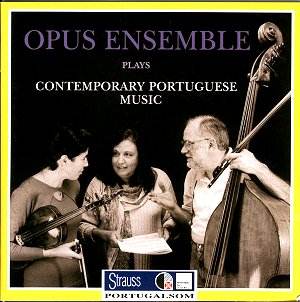Song is the thread that binds this invigorating disc
together. Whether it’s the insistent "rock and roll" of D’Almeida
or Oliva’s affectionate harmonization of old Portuguese melodies or
else Carrapatoso’s inventive fusion of idealised Azorean songs and his
own creations, this is a release that sings with life. Ironically it
also sings of death.
D’Almeida’s Rock ‘n’ Roll, like other pieces on this
disc, summons up the ghostly presence of the fourth, missing member
of Opus Ensemble, the oboist Bruno Pizzamiglio, who died of cancer in
1997. Over a now arco, now pizzicato bass pattern a rocking rhythm is
set in motion which exploits elements of neo-classicism in its search
for the transfiguration of what its composer calls hope and coherence.
It is a little piece of no more than five minutes’ duration but one
that bursts the bonds and teems with interest.
The dextrous Bass player of the ensemble, Oliva, contributes
eight traditional Portuguese songs, essentially limiting himself to
harmonization and an intriguing use of the trio medium as a means by
which both to explore and amplify the little songs. These are by turns
lyrical, beguiling, affectionate, skittish and expressive. In the third
song, Vai-te embora, o papao, for example, a vamping piano leads
to dancing string contributions, the two lines entwining affectingly,
leading onward, strongly, to the song’s close. Elsewhere felicities
of colour and sonority abound – pizzicatos and emphatic piano introductions,
high lying viola writing, dark and light tonalities, cannily exploiting
the double bass’s sonority. This is writing for the trio from the inside
by a musical colourist of discretion and imagination. Clotilde Rosa’s
Contornos is another tribute to the group and its late oboist; reflective,
ruminative and occasionally urgently impassioned it turns incendiary
before thinning to single lines and ending its journey in elegiac reflection,
part-resolved, part unresolved. Rosa’s skill in exploring the unusual
trio combination is manifest, as is her evocation of states of feeling
and expression.
Eurico Carrapatoso offers seven melodies, alternating
his own with popular Azorean tunes. His own stabbing, thrumming and
mildly discordant pieces fuse remarkably effortlessly with the languid
and reflective native melodies to create a suite both mutually dependent
and ironically detached. The opportunity has given him licence to pile
on ostinato after ostinato, to assert his own allegro against the Azorean
tunes’ natural lento-largo. The result is fresh and exciting. Filipe’s
In Memoriam is once again dedicated to Pizzamiglio and to all victims
of cancer. Beginning bleakly with a piano crash and musing string figures
the hobbled trio try to find a way through the thickets, weighed down
by an insistent piano note, obsessively ticking away, Gradually first
the viola, then the double bass embrace a new figure and slowly, after
more figuration, the trio dances the tango. It is an exhilarating moment
and one freighted with meaning and curiously moving – the tango as both
liberation and celebration of a lived life. Finally Azevedo, who has
composed Ricordo, which is partly based on Dowland’s Flow my Tears,
which precedes it, played simply and without elaboration. It’s a tough
piece, exploiting the tonal potential of the trio to optimum effect.
The viola plays stratospherically high, the double bass throbs, the
piano contributes a hypnotic ripple of sound; there is a very bad edit
at 4.36 which disturbs and impedes the fractious final quarter of the
piece before a kind of stasis envelops everything in silence.
The performances are superb, the sound good, the notes
are by the composers themselves, and the music is always quiveringly
alive.
Jonathan Woolf
ORDERING
For UK --- £6 each
Freight --- up to 3 CDs --- not registered --- £2.40; registered----
£3.50
For USA --$ 10 each
Freight --up to 3CDs -- not registered ---$5; registered ---- $6.80
Strauss accept Visa or American Express
Orders: for the attention of Eduarda Martins
by fax to the nº 351217141723
By mail to:
Rua Adelaide Cabete,3C
1500-023 LISBOA
Portugal
by e-mail to: info@strauss.pt

![]() Opus Ensemble
Opus Ensemble ![]() STRAUSS SP 4350 [57.58]
STRAUSS SP 4350 [57.58]